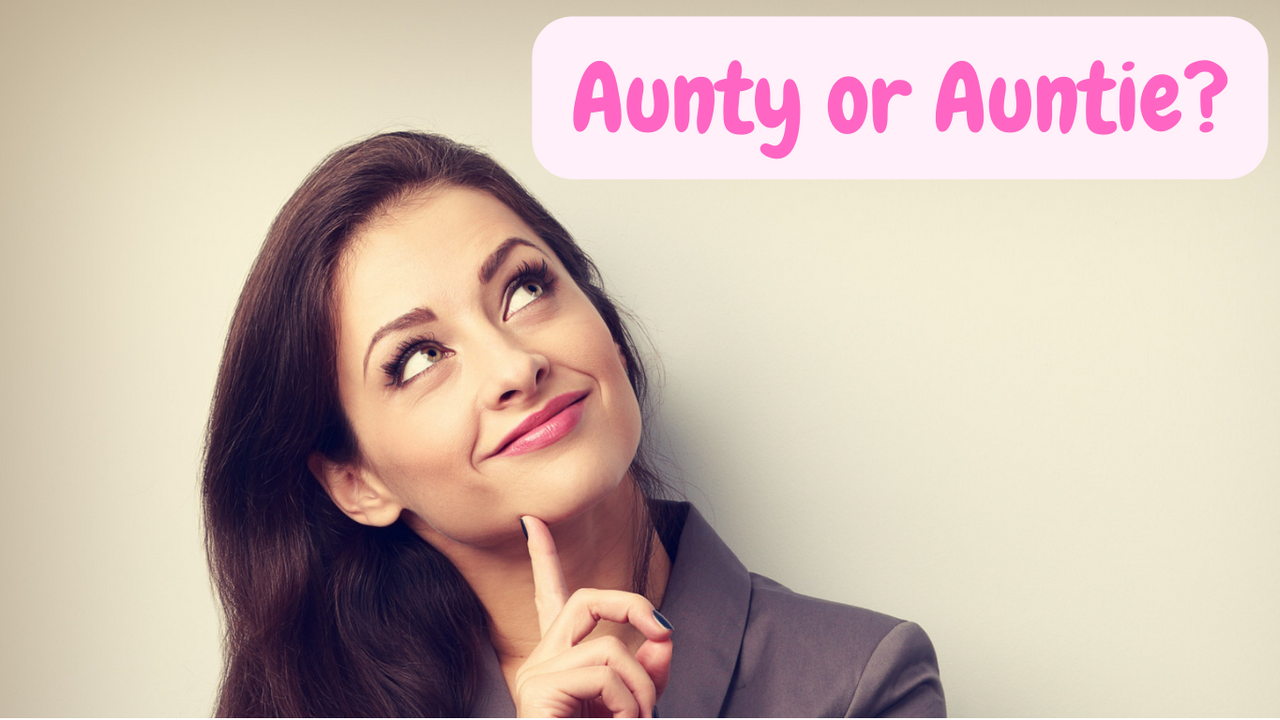Aunty or Auntie - Which is Correct - Detailed Explanation

Aunty or auntie - Which one is correct
If you are about to send your aunt a card and you need to check the proper spelling quickly, let us make it easy for you. They are both acceptable. Hurray!
Is there any difference in the meaning of the words aunty and auntie?
There are some differences that you should be aware of. Firstly the words aunty and auntie are both diversions of the word aunt, you know they are the ladies that usually come around for special occasions, like Christmas, New Year, celebrations, parties, but if they live nearby, they might drop by more often. They are your mother's sisters, your father's sister's and you're uncle's wives.
Words aunty and auntie are just informal versions of the word aunt. While aunty is more informal than aunt, auntie is the most casual one of the three.
However, the main difference is how people in different regions use them.
In some cultures, the words auntie and aunty are used to show respect to older women even if they are not related to you in any form. In some other countries, they are used as nice, more loving words to address closely related older women.

What is Aunty?
Aunty is a more affectionate way to call an aunt.
It's so good to see you, aunty. I haven't seen you since your birthday party. ( my loving aunty)
Hey mum, is aunt Jannet coming too? ( the not so popular aunt)
What is Auntie? Is Auntie a word in English?
Auntie derives from the French word' ante,' which originally came from the Latin word 'amita' meaning motherlike(like a mother). So this word was initially linked to the family, but later on, it began being used as a way to address a woman relative who might not be so close or not even be part of your family.
Auntie Sara, my mum's best friend, is coming over tonight.
Have you spoken to auntie Jane and uncle Paul these days? Their car park has been empty for weeks.
Auntie is more commonly used in American English, but it has the same meaning as the word aunty, which is more commonly used in British English.
According to merriam-webster.com, the word auntie was first used in English in 1672, while the word aunty can be found in English literature in the 18th century.
The difference in spelling - Aunty vs. Auntie
When it comes to English spelling, both "auntie" and "aunty" are accepted. Suffixes -y and -ie are often used in English to form endearing or familiar names. We often hear these suffixes added to nouns like sweetie, granny, doggie, birdy and such to add extra affection and emotion to show how we feel towards that person or thing.
So your mum's friend, auntie Suzy and you have a closer and more enduring relationship than you have with aunt Jess.
It's the little suffix that makes the difference. While aunt sounds very formal, choosing auntie or aunty to address the same person makes the reader understand you have a deeper connection and a closer relationship. Therefore we could say that you prefer Suzy to Jess.
Natives say that the monosyllable (one syllable) word 'aunt' sounds too sharp and sometimes emotionless. Therefore, it is very much in contrast with the word's original meaning, motherlike( like a mother), so suffixes 'y' and 'ie' make them that tiny bit more relaxed and endearing.

What does UK Oxford Dictionary say about these words?
According to the trustworthy Oxford dictionary, the word auntie (also aunty) noun ( pl.-- aunties) - Informal a person's aunt, while oxfordlearnersdictionaries.com shows two meanings for the word auntie:
1. an informal word for aunt and
2. (Indian English, South-East Asian English) used as a polite way of addressing or referring to an older woman.
Online dictionaries, including lexico.com, do not show the meaning of the word aunty but redirect us to auntie. So the word auntie seems to be easier to find and more recognized as the correct spelling.
How people from different countries use these words
United Kingdom
In Britain, you are very likely to hear aunty/auntie used as a more affectionate version of aunt. Another meaning, which has nothing to do with the original word but is primarily used by the older generations, is an informal name for the BBC( British Broadcast Corporation). Some people say that it has to do with their approach as a TV. They were more relaxed and cared more about their audience than other TV channels of that time. So, yet again, the word aunty is linked to something lovable and important to you.
United States of America
The word aunty is known to be more frequently used in Britain, whereas the word auntie is said to be more frequently used in America. It's primarily used to replace the word aunt.
Australia
Australians also use the terms' auntie' and 'aunty' to refer to an indigenous( native) Australian woman who has earned their respect. This is highly applicable in spoken English, but when it comes to written English, it's always safer to ask her how she would like to be addressed.
Likewise, the British Aussies also use aunty to refer to a TV channel. Aunty is an informal word for the ABC (Australian Broadcasting Association).

Plural of Singular Nouns
Auntie and aunty are singular nouns and they make their plural form as every other regular noun.
auntie – aunties
aunty – aunties ( similar to candy - candies or baby- babies)
Having three aunties is the best thing ever. My oldest auntie is always there to hear me out, the middle one is always up for an adventure and the youngest auntie knows how to convince my mum.
Now grab the pen and write your auntie/aunty that card you're about to send. I'm sure she will love it, but please don't rely on just the suffixes to show her how you feel, write it in full words.























